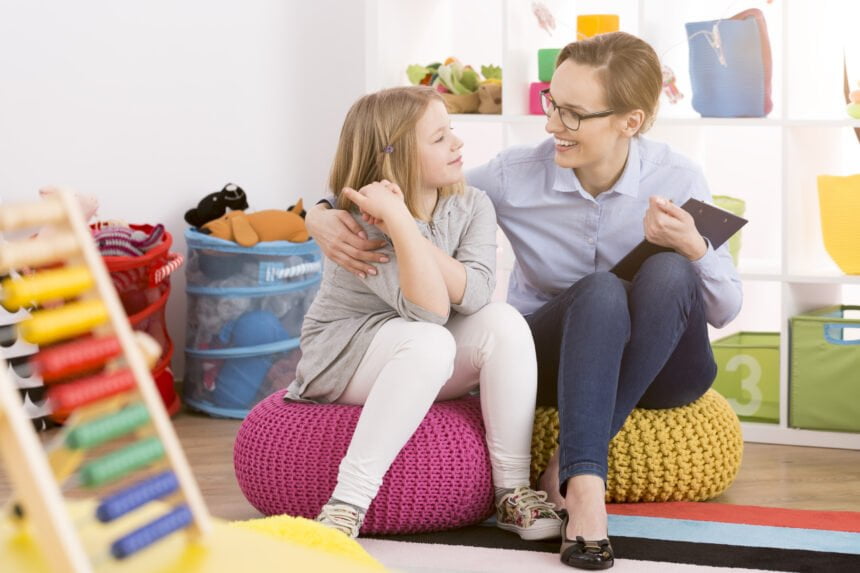Most experts estimate that around one out of every 36 children struggle with autism. They often struggle with mental health issues, which can be addressed with the right interventions.
Socialization plays a pivotal role in enhancing the mental health of children with autism spectrum disorder (ASD). Through social interactions, they develop crucial communication skills, emotional regulation, and empathy, fostering a sense of belonging and acceptance. Engaging in group activities encourages teamwork, builds self-confidence, and reduces feelings of isolation. Furthermore, socialization provides opportunities for practicing social cues and understanding social norms, contributing to improved social integration and overall well-being in children with autism.
Utilizing play as a therapeutic tool can significantly aid in the development of social skills among children with autism, positively impacting their mental health. Play fosters spontaneous interaction, promotes turn-taking, and encourages the understanding of non-verbal cues essential for social communication. Through imaginative play scenarios, children with ASD learn to navigate social situations, express emotions, and establish connections with peers, fostering a sense of belonging and emotional well-being crucial for their overall development.
Remember the days of building blanket forts, concocting imaginary adventures, and giggling over shared secrets? The magic of friendship, woven into the fabric of childhood, holds immense power for development and well-being. But for children with autism, navigating the intricacies of social interaction can present unique challenges. Fear not, though! The playground of imagination, through the power of play, can become a springboard for fostering essential social skills and nurturing lifelong friendships with the help of autism therapy in Chicago.
Building the Playground of Friendship
Children with autism often grapple with specific social skills, like initiating interactions, understanding emotions, and taking turns. These are all important skills to help them make friends.
These seemingly effortless exchanges can feel like complex puzzles. Enter the world of play, a natural learning environment where these skills can be practiced safely and engagingly. Imagine building elaborate worlds with blocks, where communication flows through shared narratives. Picture collaborative games where teamwork brings victory, fostering problem-solving and compromise. Play, in its various forms, becomes a laboratory for social interaction, allowing children to experiment, make mistakes, and learn without judgment. Additionally, structured programs like ABA therapy in Chicago or social skills groups can provide valuable support and targeted practice for developing these crucial skills.
Playful Pathways to Connection
The playground of friendship extends far beyond structured games. Different types of play offer unique opportunities for social development:
- Imaginative play: Let dragons roar and princesses rescue each other as children weave stories together. This fosters empathy, understanding different perspectives, and the art of give-and-take in creating a shared narrative.
- Cooperative play: Building a tower block by block or navigating a board game as a team teaches valuable lessons in communication, collaboration, and even conflict resolution. Celebrate successes and learn from missteps, all while building connections through shared experiences.
- Sensory play: From building sandcastles to exploring textures together, sensory play can build trust and reduce anxiety. The focus on shared enjoyment creates a safe space for interaction and strengthens the bond between individuals.
Remember, the key lies in facilitating these types of play at home. Provide open-ended toys, encourage participation, and most importantly, join in the fun! By actively engaging in playful experiences, you become a guide and a partner, helping your child navigate the social landscape.
Beyond the Backyard: Expanding the Social Circle
While the backyard playground offers a safe space for social exploration, fostering friendships often requires venturing beyond familiar territory. Parks, playdates, or even joining clubs open doors to diverse social settings and interactions. But for children with autism, these new environments can be overwhelming. So, how do we prepare them for success?
Building Confidence Through Preparation
- Practice social skills: Role-play greetings, introductions, and simple conversations at home. Use dolls, puppets, or even mirrors to create a safe space for practicing.
- Visual aids can be powerful tools: Create social stories to explain new situations and expected behaviors. Visual schedules can also provide comfort and predictability.
- Familiarity breeds comfort: Visit the park or club beforehand, even for a brief observation. This allows your child to become accustomed to the sights, sounds, and potential sensory experiences.
Structured programs like Aurora ABA therapy can also offer valuable support in preparing children for new social settings. Through targeted interventions and social skills groups, therapists can help build confidence and equip children with the tools they need to navigate unfamiliar situations.
Remember, progress takes time and patience. Celebrate small victories, like initiating a simple interaction or participating in a group activity. Positive reinforcement and encouragement go a long way in building confidence and motivation.
Building Bridges: Supporting Friendships Beyond Playtime
The initial sparks of connection are ignited, the laughter shared, and a new friendship seems to blossom. But for children with autism, maintaining these connections can be a new challenge. Fear not, parents and caregivers! Here are some tips to help your child navigate the social landscape beyond the confines of playtime:
- Encourage open communication: Create a safe space where your child feels comfortable expressing their feelings and experiences, both positive and negative. Active listening and open dialogue are crucial for understanding their social needs and concerns.
- Practice social greetings: Role-play simple phrases like “hi,” “how are you?” and “goodbye.” Encourage initiating these greetings with friends and acquaintances in familiar settings.
- Teach conflict resolution skills: Equip your child with tools to navigate disagreements. Role-play simple scenarios and discuss strategies like using “I” statements and finding compromises
- Positive reinforcement is key: Recognize and celebrate even small social victories, like initiating a conversation or participating in a group activity. Verbal praise, encouragement, and even tangible rewards can go a long way in boosting confidence and motivation.
- Offer support when needed: Don’t shy away from intervening if your child needs help navigating a challenging social situation. Gently guide them, but remember, the goal is to gradually empower them to handle these situations independently.
Collaboration is Essential
Open communication with educators and therapists: Maintain open communication with your child’s teachers, therapists, and any other professionals involved in their support system. Share challenges, successes, and strategies, fostering a collaborative approach to supporting their social development.
Don’t hesitate to seek additional support from professionals like counselors or social skills groups. These resources can provide targeted interventions and personalized guidance to address specific social challenges your child might face.
Remember, building lasting friendships takes time, patience, and a supportive network. By fostering open communication, celebrating successes, and collaborating with professionals, you can help your child build bridges of friendship that enrich their lives and pave the way for a brighter, more connected future.
Conclusion
This concludes our exploration of fostering friendship fundamentals through play for children with autism. While this article has equipped you with tools and strategies, each child’s unique path to friendship blossoms at their own pace, nurtured by love, patience, and unwavering support with the help of social skills groups for autism near me.
Embrace the power of play in all its forms, from backyard adventures to imaginative storytelling. Let it be the springboard where social skills take flight, where laughter becomes the language of connection, and where the seeds of lifelong friendships are sown.
Celebrate even the smallest victories, a shy smile exchanged, a hesitant wave offered, a name confidently spoken. Each step, no matter how small, paves the way for greater social engagement and fosters the confidence your child needs to navigate the world with open arms.








_8-250x220.jpg)